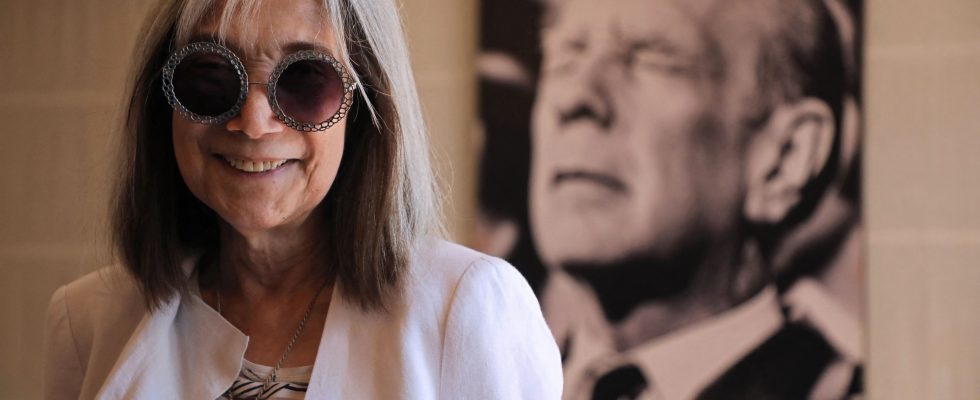In Buenos Aires, after having nicknamed it for a long time la hija del samurai (or “the Samurai’s daughter”), which had a little something affectionately exotic, it was only called the viudisima (“la veuvissime”), which was much less so. The fact is that Maria Kodama reigned supreme over the legacy of Jorge Luis Borges. The great Argentine writer had made her his universal legatee. After meeting him at 16 and then being his university student, she had lived with this man who was thirty-eight years older than her, arm-in-arm with the most famous blind man in contemporary literature, reading to him , writing under his dictation, accompanying him in his conferences, acting as his spokesperson, before being married via the Argentine consulate in Asuncion (Paraguay), while the couple was living in Geneva, in April 1986, i.e.… three months before Borges’ death. Since then, she was the guardian of her temple. All the academics and writers who had to frequent it for their research have not kept the best memories of it.
Five nephews and nieces showed up at the lawyer
She has just died at the age of 86 of cancer without leaving a will. All the more embarrassing that the couple had no children. The day after the announcement of her disappearance, five nephews and nieces of the deceased presented themselves to her lawyer Fernando Soto in order to assert their rights. Such a rush to recover valuable manuscripts, rights to translations and to theatrical, cinematographic and musical adaptations, as well as the house housing the headquarters of the Borges Foundation and apartments in Buenos Aires, Paris and Geneva, this eagerness , therefore, obviously owing nothing to the admiration for The Book of Sand nor even for a very famous uncle whom they hardly had to know, the lawyer tempered their extra-poetic ardor. He knew his client was cut off from her own family to the point of denying her existence.
“I have put my affairs in order,” she assured the council of the Borges Foundation, which does not believe for a moment that she wrote a will without going through him or a notary. Maria Kodama would have liked to divide the literary heritage between two universities, one Japanese, the other American (Harvard or University of Texas, because the writer had taught there), but this remains unverifiable. If no testamentary document came up during the inventory of his property, it would be a final snub to this hated family. And even more, as the poet Santiago Llach imagines it, as “a punk attitude meaning that the widower had never given a shit… to all that”.
When Maria Kodama opposed the reissue of the Pléiade Borges
Notoriously litigious, Maria Kodama had recently sued writer Pablo Katchadjian for “plagiarizing” The Aleph. Each time a friend of her husband published a book of memories or interviews in homage to her genius, she violently denounced him (Adolfo Bioy Casares) or took him to court (Ernesto Sabato). The slightest tribute was frowned upon when it escaped his absolute control. Basically, it was an honor to be part of the Legion of Outlaws. I admit that I was in 2006 for having dared to investigate a strangeness. Having noted that the Pléiade Borges, unanimously acclaimed for its quality, had not been found in bookstores for seven years, I had concluded following an investigation that Maria Kodama was opposed to its reissue when it was the world’s only edition of the complete work. Taken to court, the case revealed that she was preparing her own Spanish edition under the aegis of her foundation. The trial had the virtue, after negotiation with Gallimard, of unblocking the distribution of this famous Pléiade. And since then there has been no other edition of Borges’s complete works…
On April 27, the Buenos Aires Book Fair will open. Its director Alejandro Vaccaro, a fervent Borgesian, will be keen to commemorate the centenary of Fervor of Buenos Aires, his first published book. But as Maria Kodama had also sued him on the grounds that he would have taken advantage of the image of her husband, nothing is certain. A provisional administrator will certainly be appointed to manage the inheritance. If no one is legitimate, in ten years the city of Buenos Aires will benefit. According to Argentine law, Borges’ work will not fall into the public domain until 2056.
